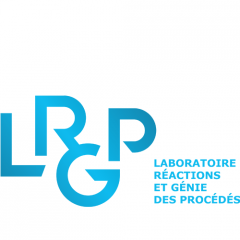The Reactions and Chemical Engineering Laboratory (LRGP) is a joint unit of CNRS (National Center for Scientific Research) and Université de Lorraine.
On 1 January 2019 the laboratory had a 300-plus workforce, including 18 CNRS researchers, 82 research professors and lecturers, 43 technical and administrative employees as weil as 180 non-permanent staff (contract researchers, 82 doctoral students, post-doctoral fellows and Master's students).
The Process Engineering and Reactions Laboratory (LRGP) develops the necessary scientific and technological knowledge for designing, studying, running and optimising the complex processes of physicochemical and biological conversions of mass and energy. lts themes therefore incorporate the conventional scope of chemical engineering via study of the coupled processes of transfer of mass, heat and flows, physical chemistry, such as kinetics and thermodynamics, and biology, with consideration of the complex interdependencies and interactions between processes at different spatial and temporal scales. This integrative approach encompasses a growing dimensional spectrum ranging, on the one hand,from nano and microscales for improving the consideration of local phenomena, including by integrating or developing the very fundamental approaches of physics, quantum chemistry or biology to, on the other hand, large systems, at the scale of the reactor,process, plant or even territory.
Broadly speaking, the backbone structuring the approaches explored at the LRGP includes:
• detailed knowledge of processes at micro and even submicroscopic level (detailed chemical or biochemical kinetics,statistical physics,etc.);
• the multi-scale approach to progress from this local knowledge to knowledge and control of the process, and of the plant even;
• the development of robust metrology at an increasingly local scale,implemented to meet
the objectives of the first two approaches and to be able to control the processes.
The applications studied are multiple and are geared towards the societal implications of conversion processes, and more generally of a cleaner, safer plant of the future, which is resource efficient (energy, fossil fuels and mineral resources} and practises waste recovery, conversion of bio-based products and synthesis of recyclable materials and products. The laboratory's research activities thus bear on,for example:
- improving the effectiveness of conversion and treatment processes via the integrated mana gement of mass and energy flows enabling the recycling and recovery (eco-design) of by-products (low-level energy and waste);
- reducing the carbon footprint of conversion processes by using bio-based and petroleum-based resources, cutting back on process water consumption, recycling and reducing pollution,capturing, storing and recovering C02 and reducing industrial risks (dean, safe processes);
- the synthesis of eco-compatible and recyclable materials and products that are more respectful of humans and the environment as weil as designing and developing high-performance complex products (chemical or biochemical) via an organisation at the molecular, macromole cular and colloidallevel.
The importance of both the economie aspects of sustainable processes via a life-cycle cost analysis,and the societal aspects via a sociallife-cycle assessment is also factored in.
The Process Engineering and Reaction Laboratory is organised around 5 main thematics department:
• Processes for the environment, safety and recovery of resources(PErSeVAL)
• Processes, Reactors, Intensification, Membranes, Optimization(PRIMO)
• Bioprocess-Biomolecules(BioProMo)
• Cinétique, Thermodynamique et Energie (CITHERE)
• Product Engineering
